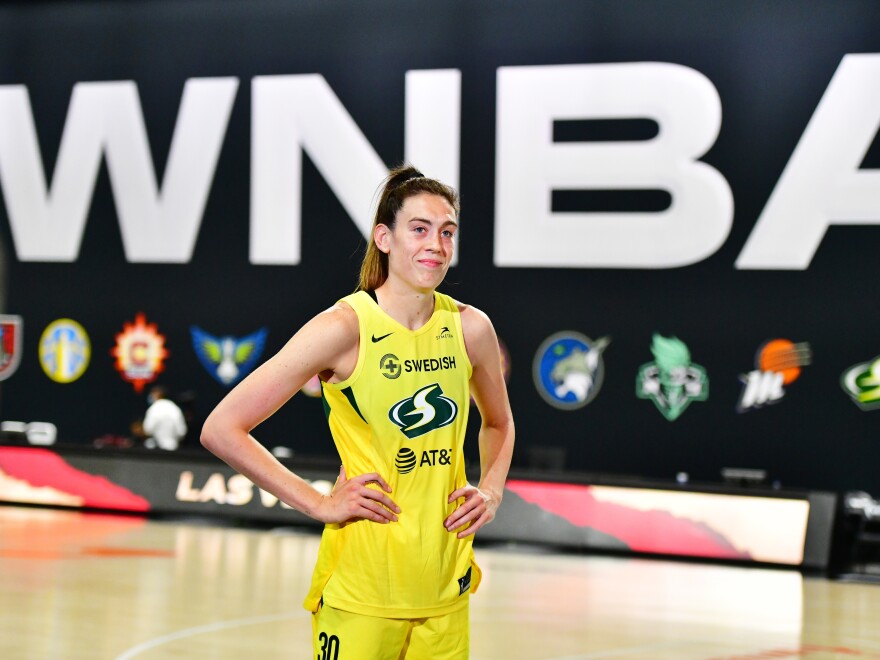Go to your local sports store and you'll find the shelves groaning under the weight of sneakers named for men's basketball stars: Under Armour Currys, the Kawhi by New Balance and many varieties of Jordans — though it's been a long time since MJ dunked in an NBA game.
What you won't find is a single shoe named for a current WNBA player, though that is about to change. On Wednesday, Breanna Stewart, the power forward for the Seattle Storm, announced a deal with Puma that includes her own signature sneaker.
"It's a monumental day for the basketball world, for women's basketball and for the athletics industry as a whole; I think, even larger, for women's endorsement deals in particular," says Nick DePaula, who covers the sneaker industry for ESPN and for the Boardroom web series The Sneaker Game. "It's been a full decade since the last women's signature shoe. There's currently 18 NBA players that have their own signature shoe, and no woman."
The very first women's basketball player to get her own signature shoe was Sheryl Swoopes back in 1995. Others followed, but as the WNBA begins its 25th season on May 14, Stewart will be only the 10th player to pen a signature deal, following Candace Parker's deal with Adidas.
DePaula spoke to NPR's All Things Considered about why there was a decade drought in women's signature basketball shoes, how sponsorship deals factor into the pay gap between male and female athletes and the way Stewart hopes her deal leads the way for more women's shoes to come.
This interview has been edited for length and clarity.
Interview Highlights
On the history of women's basketball shoe deals, from Sheryl Swoopes to now
So Sheryl, back in '95, that was really the starting point of the WNBA, which launched in 1997. Seven of the first nine women's signature shoes were within the first five years of the WNBA. Then I think what happened was brands were looking at slowing sales and turned away from it altogether. It's been unfortunate because I think there's now there's a whole generation of young girls that grew up playing the game that didn't aspire to have a signature shoe. Yes, they could aspire to play in the WNBA, but it wasn't something they had visibility to [do]. And now, to see a brand like Puma take a chance on Breanna Stewart and really step up with a massive deal for her to get her own signature shoe, it's long overdue.
On how sponsorship disparity contributes to the pay gap between male and female athletes
There is a bit of a gap. It is a little tough, because the NBA season is 82 games; WNBA is 32. But even within that, the household names — let's say the top 10 NBA players — where they're making anywhere from $8 to $15 million a year. From the WNBA standpoint, you're looking at a six-figure [to] a mid-six-figure deal per year. So it's a far-off gap there. Even the NBA players, that's the biggest thing of a signature shoe deal is you have a 5% royalty as well, so you're making even more money off the sales of every footwear item, every apparel piece.
On the potential "domino effect" of this deal
If Breanna Stewart can lead the way here, and I spoke with her on Monday and she's hoping this has a bit of a domino effect and that more signature shoes come as well. She said "I hope this becomes a competitive thing and turns into a domino effect," which was word-for-word. There is definitely a competition. There were so many players hoping to be the next and the 10th person to get a signature shoe. For Stewie, that's definitely a point of pride that she can say she was the 10th one in the 25-year history.
Copyright 2022 NPR. To see more, visit https://www.npr.org.



